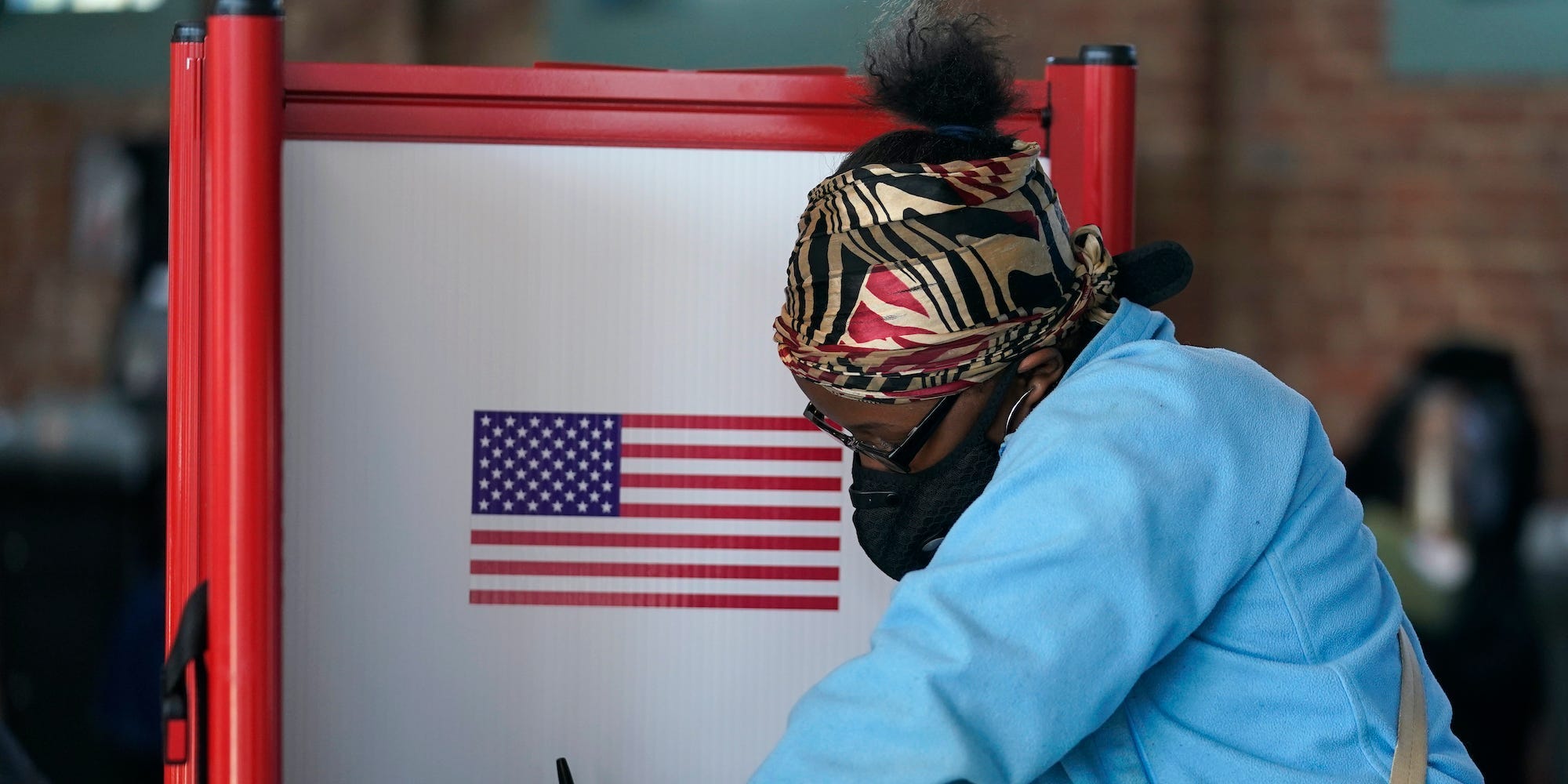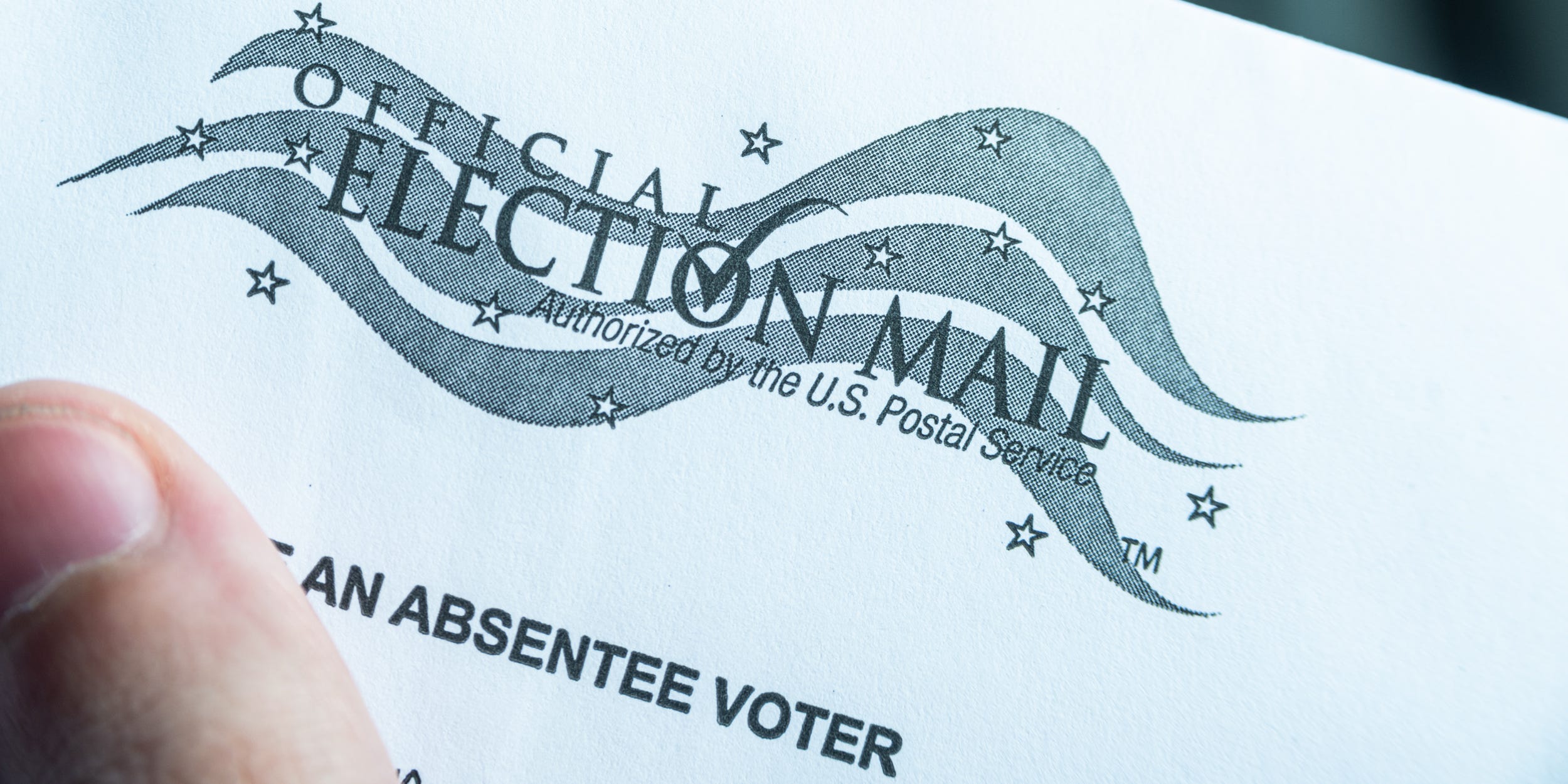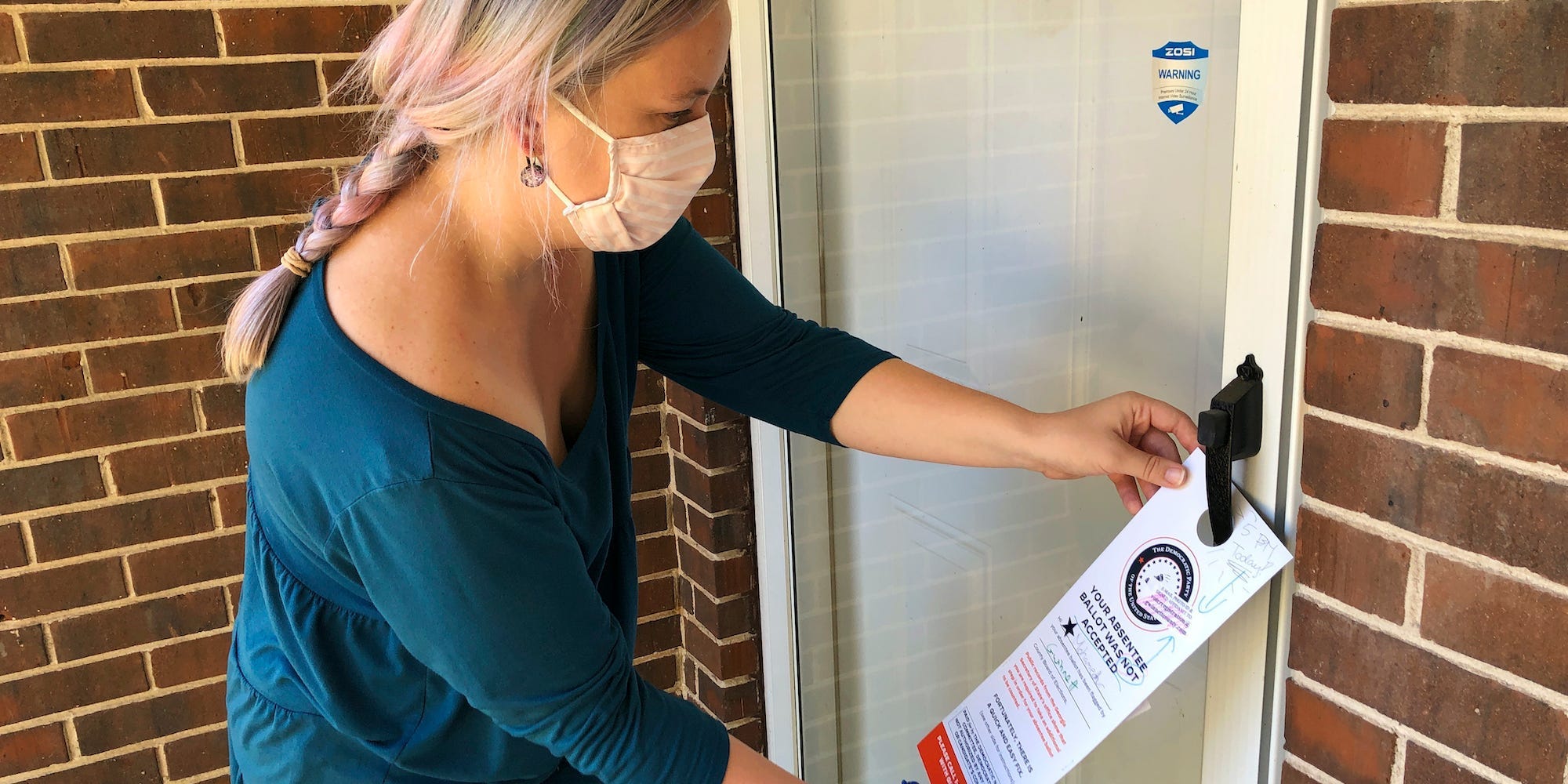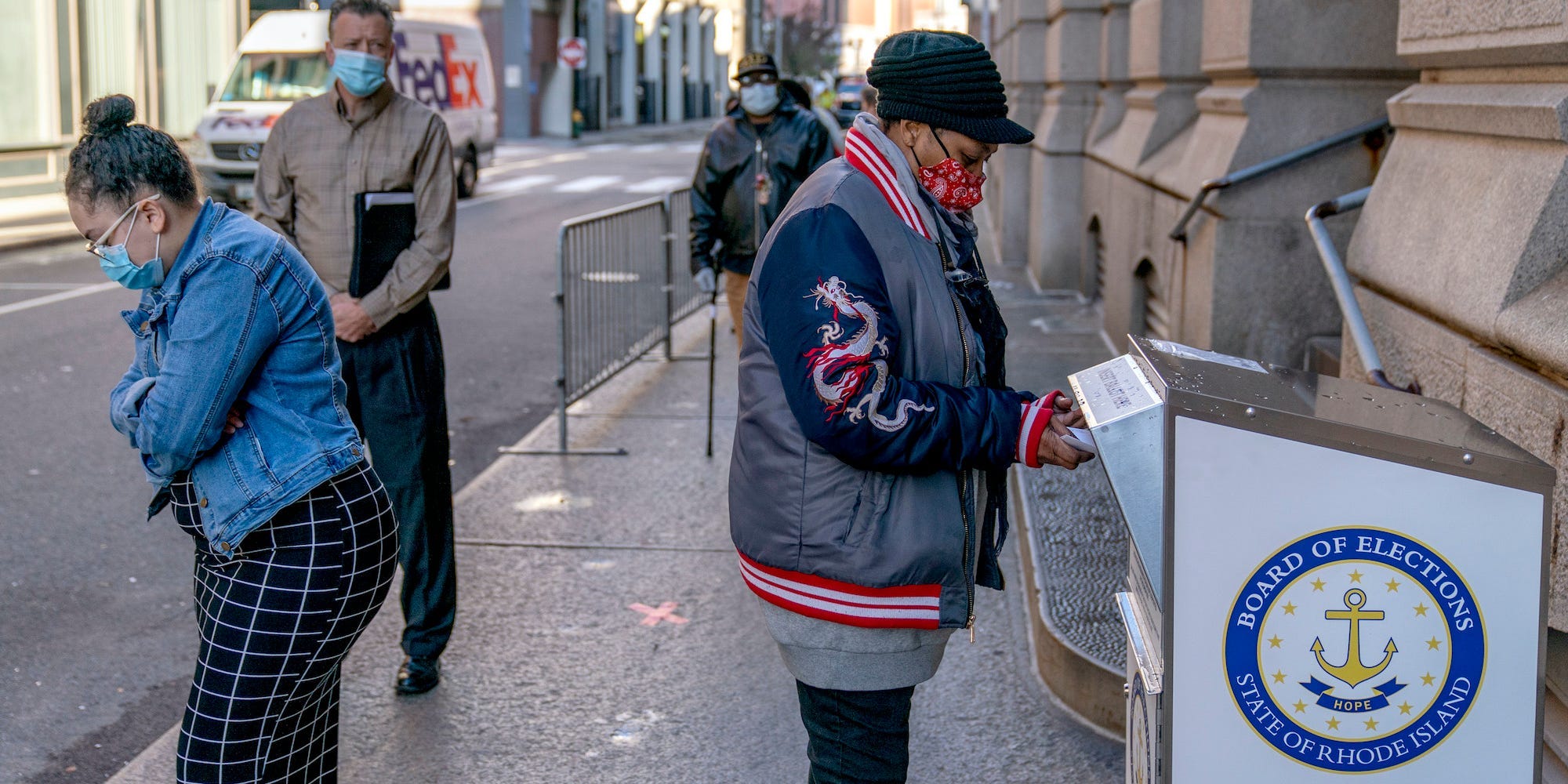
AP Photo/Darron Cummings, File
- Republican lawmakers in multiple key states are taking action to restrict voting.
- But not all efforts, especially around voting by mail, are restrictive.
- Legislators in numerous states, both red and blue, are advancing bills to expand voting.
- See more stories on Insider's business page.
State legislatures around the country are tackling more voting- and election-related policies in 2021 than any year in recent memory, giving election administration a rare place in the national spotlight.
An analysis from the Brennan Center for Justice found that, as of February, lawmakers in 43 states have introduced and filed over 250 measures that would restrict voting, a statistic now cited multiple times a day on cable news and in newspapers. The Center also found a far less-cited metric: legislators have introduced over 700 pro-voter measures that would expand voting and registration opportunities.
Now comes the question of what to make of those two numbers.
"You can't just put 700 on a scale and 250 on a scale and say, 'Well, there are more expansive bills, so things are better for voters across the country,'" Eliza Sweren-Becker, counsel for the Brennan Center's Democracy Program, told Insider. "And that's just because of the nature of state politics."
Not all bills are created equal, and in state legislatures especially, there are thousands of bills that never make it out of committee or aren't given a hearing. The state-level context is also important: the same bill to limit mail voting could be easily passed through a GOP legislature but be dead on arrival in a Democratic one.
"There are lots of expansive bills being introduced in places where they're not so likely to pass, like Missouri," Sweren-Becker said. "There are tons of expansive bills that have already failed in Mississippi, lots of expansive bills in Texas and South Carolina. And so that's why the number of expansive bills does not necessarily reflect the likelihood of overall changes to voting systems across the country."

Experts say that we shouldn't miss the forest for the trees
Researchers at the nonpartisan National Vote at Home Institute, however, argued in a recent blog post that when it comes to mail voting especially, observers should be "alert" but not "anxious" about the national legislative outlook.
"When anti-mail ballot legislation is given an outsized platform, the trust voters have in that system is eroded," they wrote.
By their analysis, only 15% of the bills introduced this year would tighten restrictions on mail voting, making for a three-to-one ratio of measures that would expand versus restrict mail voting.
"Regardless of a legislative makeup or how you want to think about electoral politics, we're trying to make the point that that this conversation is happening everywhere and these bills are popping up everywhere," the organization's National Policy Director Audrey Kline told Insider.
She added: "There's a no-excuse absentee bill in Alabama, even though I can tell you with like 99% certainty that that bill won't pass, I think it's important to acknowledge that that conversation is still happening in a place where it's not likely to become law ... and giving a little bit of oxygen to these issues is still really, really important to us."

AP Photo/Sudhin Thanawala, File
Blatant efforts to curtail voting access are causing alarm
At the forefront of the national attention, however, are what Sweren-Becker called "an effort at voter suppression that is unprecedented since the Jim Crow era" - a backlash to President Joe Biden's win in 2020.
States of particular concern to voting rights advocates include Arizona and Georgia, which have rapidly shifted from red to purple in the past decade, but still have state governments controlled by Republicans. GOP lawmakers in both states are advancing bills that would place greater restrictions on mail voting and, in some cases, early in-person voting.
Republican lawmakers are even pushing voting restrictions in states where former President Donald Trump and other down-ballot Republicans won handily in 2020 under the guise of boosting "election integrity," although there was no evidence of widespread voter fraud in the 2020 election.
Meanwhile, GOP legislators in Florida are advancing a bill that would ban ballot dropboxes, curtail the state's permanent vote-by-mail program, and further restrict already-limited third-party ballot collection.
Top lawmakers in Texas are pushing forth legislation that, among other things, would require voters with disabilities to obtain a doctor's note to vote absentee, and ban counties from holding drive-thru voting or keeping voting locations open after 7 p.m. local time - policies that officials implemented in heavily Democratic Harris County in 2020.
Montana lawmakers are in the process of repealing same-day voter registration. And in Iowa, the state's governor, Kim Reynolds, recently signed a bill that will reduce early voting by nine days and cut an hour of voting on Election Day.
"These bills are being introduced on the basis of the former president's Big Lie about the elections last year," Sweren-Becker said. "They're being justified based on lies about voter fraud that didn't happen and lies about election irregularities that did not occur."
The brazen campaigns to curtail voting in response to the results of 2020 are of the most concern. But policy experts at both the Brennan Center and Vote at Home still have their eye on solidly blue states that don't get nearly as much national attention as the battlegrounds, but could be pivotal in forging progress for the voting rights movement nationwide.

AP Photo/David Goldman
The little-noticed efforts to expand voting could have national impact
Several safely Democratic states that were still behind the curve on offering multiple voting opportunities, like Connecticut, Massachusetts, Maryland, and New York, are moving to make pandemic-era expansions of no-excuse mail voting and early voting permanent and increase registration opportunities.
"There are a lot of things going on on the Eastern seaboard ... in places like Rhode Island and Delaware and New Jersey," Kline said. "They've got a lot of interesting bills and a lot of possibility. A lot of these places that are sort of traditionally very dark blue, some of them have passed over opportunities in the past to innovate and create more opportunities for voters."
Virginia Gov. Ralph Northam recently enacted an executive order to restore voting rights to 69,000 returning citizens with felony convictions, and is soon expected to sign Virginia's own state-level voting rights act into law.
In Kentucky, where expanded mail and early voting was offered for the first time in 2020, Republican lawmakers are backing a bill to make in-person early voting and the state's online absentee ballot request portal permanent fixtures in the state.
Ultimately, the Vote at Home Institute concluded that the "sheer volume of pro-voter bills means that states are broadly headed in the right direction." Sweren-Becker also told Insider that even if many of those bills are dead-on-arrival in deep red states, they could be the seeds of longer-term movements within those states.
"That at least lays a marker down, it sets an agenda, and introduces policies that lawmakers can start to socialize, even if they don't pass this year," Sweren-Becker said, adding that she's seeing many lawmakers "learn from the successes of last year" in expanding mail voting and modernizing it for the 21st century.
In a recent op-ed for The Fulcrum, Massachusetts-based voting rights lawyer Patrick Roath similarly argued that voting expansions that do end up passing are not only important for the voters who would immediately be affected, but can move the needle for similar efforts in other states and at the federal level.
"Based on my advocacy experience, it's very persuasive to point out to a lawmaker that 21 other states and the District of Columbia already have same-day registration and then say: 'If they can do it, why can't we?' This kind of challenge tends to motivate people,'" he wrote.
